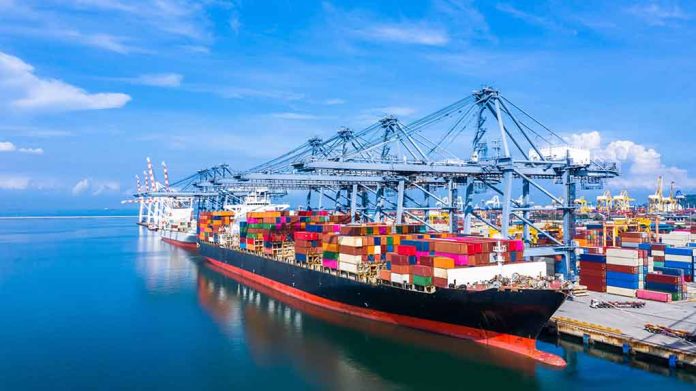
House Republicans introduce a bill to block China from accessing U.S. ports, igniting fierce debate over national security and economic dominance.
At a Glance
- GOP Rep. Michelle Steel introduces the Secure Our Ports Act to block China and other adversaries from accessing U.S. ports
- Bill targets companies owned by state enterprises in China, Russia, North Korea, and Iran
- Legislation aims to protect U.S. supply chains and national security
- Follows concerns about Chinese equipment and cranes at U.S. ports potentially being used for surveillance
- Comes after U.S. Congress banned Pentagon from using seaports relying on Chinese logistics platform LOGINK
GOP Takes Aim at China’s Port Access
In a bold move that’s sure to ruffle some feathers in Beijing, House Republicans are rolling out legislation aimed at giving China the boot from our precious ports. Rep. Michelle Steel, a member of the House Select Committee on Communist China, is leading the charge with her aptly named “Secure Our Ports Act.” This isn’t just about China, folks. The bill takes aim at companies owned by state enterprises in Russia, North Korea, and Iran as well. It’s like a who’s who of countries we’d rather not have snooping around our shipping lanes.
Steel, hailing from Southern California – home to two of the largest U.S. ports, Los Angeles and Long Beach – isn’t mincing words about the urgency of this matter. She’s got a point when you consider that Chinese-owned conglomerates like COSCO and COFCO are already setting up shop in American ports. It’s like letting the fox guard the henhouse, and Steel isn’t having any of it.
House GOP rolling out bill to block China from accessing US ports https://t.co/aBlIaOvTdc
— Fox News (@FoxNews) September 13, 2024
National Security Concerns Drive Legislation
Now, you might be wondering why all the fuss about some shipping containers and cranes. Well, it turns out those innocent-looking pieces of equipment might be doing more than just moving cargo. National security and defense officials have been raising red flags about Chinese equipment and cranes at U.S. ports potentially being used for surveillance. It’s like something out of a spy novel, except it’s happening right under our noses.
“Nations which threaten the very existence of the United States should not have easy access to our port infrastructure, a key lifeline of America’s supply chains.” GOP Rep. Michelle Steel
The Secure Our Ports Act isn’t coming out of nowhere. It’s building on previous efforts to keep our ports safe from prying eyes. Congress has already passed legislation banning the Pentagon from using any seaport that relies on the Chinese logistics platform LOGINK. This system, which tracks cargo and ship movements, essentially gives Beijing a front-row seat to America’s military supply chain. Talk about a security nightmare!
The LOGINK Dilemma
LOGINK isn’t just some small-time operation. This beast, operating under the Chinese Communist Party, has its tentacles in about 100 ports across more than 60 nations. It’s like a global game of Risk, and China’s winning. The U.S.-China Economic and Security Review Commission (USCC) didn’t mince words when they pointed out the danger:
“LOGINK’s visibility into global shipping and supply chains could also enable the Chinese government to identify U.S. supply chain vulnerabilities and to track shipments of U.S. military cargo on commercial freight.” – The U.S.-China Economic and Security Review Commission (USCC)
The ban on LOGINK is set to take effect six months after President Biden signs the bill. But here’s the kicker – there’s no real alternative to LOGINK that operates on the same scale. It’s like trying to quit social media cold turkey; easier said than done. Experts say it could take up to five years to develop a viable alternative. In the meantime, we’re left hoping that the free market can come up with something faster than you can say “supply chain disruption.”
Global Implications and Challenges
This isn’t just a U.S. problem. The ban requires the secretary of state to negotiate with allies and partners to remove LOGINK from their ports too. It’s like trying to get everyone at a party to agree on the same playlist – good luck with that.
As we navigate these choppy waters of international trade and security, one thing’s for sure – the debate over China’s access to U.S. ports is far from over. It’s a high-stakes game of economic chess, and the next move could determine who controls the board. Stay tuned, folks. This port saga is just getting started.

















